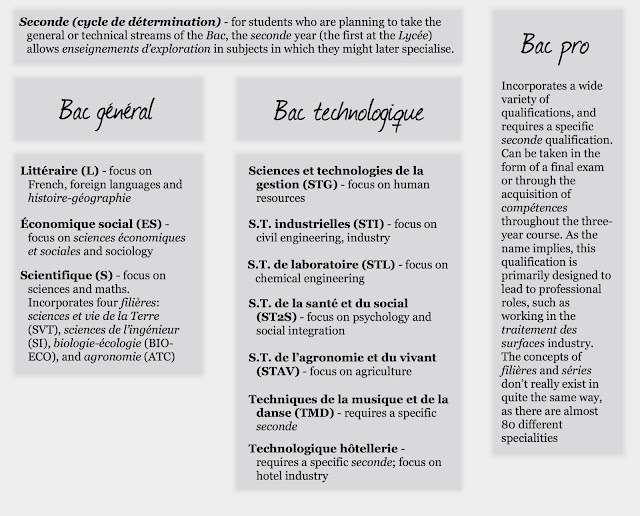At its heart, a lycée is broadly similar to an American high school or a UK sixth-form college, in that it forms the last part of secondary education (l'enseignement secondaire) before universities, or other forms of tertiary education. Students are split into three years: seconde (15 - 16 years old), première (16 - 17) and terminale (17 - 18). The first of these is effectively a continuation of the collège, but also marks the point where an element of student choice enters the system. Students can opt to take different enseignements d'exploration, which will likely inform their choice of specialisation in future years. Arts-inclined students will likely take littérature et société, budding economists will be more attracted to sciences économiques et sociales, and so on. For this reason, the seconde year is also sometimes called the cycle de détermination.
Coming into their première year, students must make this choice. There are two main decisions to make here, the first being which voie (literally "route") to take. There are three to choose from here: général, for most traditional "academic" subjects; technologique, for more "applied" options; and professionel, which often leads directly into a work placement (and which is selected immediately after collège, without a cycle de détermination). Each of these gives its name to the kind of baccalauréat exam that the student will take at the end of their terminale year.
Within their chosen voie, students must also select a série ("series"), and then potentially a further specialisation in their terminale year. There are quite a few of these, so I thought the best thing to do would be to summarise them in a handy diagram:
Regardless of the specialisms chosen, the baccalauréat exam itself differs from A-Levels in number of ways. The most important of these is that it is a single qualification, incorporating a range of different subjects: students receive a single certificate, rather than four different ones for each subject. Also crucial here is that some subjects are still obligatory, including (in almost all the séries) at least one modern foreign language. This is a huge contrast from the UK, where a student might have dropped modern languages altogether two years before the Bac even starts.
The school I teach in is a Lycée générale technique, meaning that it offers a mixture of général and technologique series. In this case, it offers ES and S qualifications from the général series; a large number of the seven technologique series; and one professionel series (traitement des surfaces). This does, of course, mean that none of my students are doing the bac L, and that hence none of them will go on to study English at university. Although this can be a little discouraging, it's more than balanced out by the fact that the school does have a section européenne. This means that one class in every year will, in addition to having extra English lessons, be taught one other discipline non linguistique in English. Since my school is largely scientific, our section européene is in the sciences, but this varies between schools.
"But what does this matter to you, Edward?", I hear you say. "Surely, if English is obligatory for almost everyone, you end up teaching more or less the same thing to all students in the same year group?" And that's not entirely wrong - although there are some minor variations in the programme, I'll likely find myself teaching the same lesson on Robin Hood to a group of 16-year-old economists as I would to a group of 16-year-old human resources specialists. However, all of this does have one very, very big impact on my timetable: acronyms.
Riveting, I know. But when your timetable says something like "2D Euro at 10am, followed by 1STMG1 at 11, then TSSI3 at 2pm", it's worth deciphering what all these mean. Plus, it really helps when it comes to getting to know your students. So let's break down a couple of acronyms together! (Note that I don't actually teach any of these classes.)
- 1SSI4 - Premières (1), Bac scientifique (S), sciences de l'ingénieur (SI), fourth class (4);
- 2D3 - Secondes (2), cycle de détermination (2), class 3 (3);
- TMerc3 - Terminales (T), mercatiques (Merc, a specialisation in STMG), third class (3);
- TSB4 - Terminales (T), sciences biologiques (SB, a specialisation in S), fourth class (4).
Sources
1. 'Wikipedia' (sorry!), Le Baccalauréat en France, fr.wikipedia.org/wiki/
2. ONISEP, Les enseignements d'exploration en seconde, www.onisep.fr
3. Ministère de l'éducation nationale, Le baccalauréat, www.education.gouv.fr/

